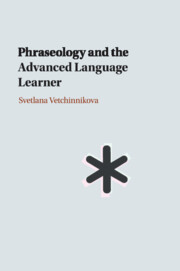Book contents
- Phraseology and the Advanced Language Learner
- Phraseology and the Advanced Language Learner
- Copyright page
- Contents
- Figures
- Tables
- Acknowledgements
- Abbreviations
- Chapter 1 Introduction
- Chapter 2 From a Unit of Meaning to a Meaning-Shift Unit
- Chapter 3 L2 Use and Processing of Multi-Word Units
- Chapter 4 Triangulating Usage, Exposure and Processing
- Chapter 5 Meaning-Shift Units in L2 Learning and Use: Usage vs. Exposure
- Chapter 6 Meaning-Shift Units in L2 Processing: Usage vs. Word Association Responses
- Chapter 7 Towards the Bigger Picture
- Book part
- References
- Index
Chapter 1 - Introduction
Published online by Cambridge University Press: 18 November 2019
- Phraseology and the Advanced Language Learner
- Phraseology and the Advanced Language Learner
- Copyright page
- Contents
- Figures
- Tables
- Acknowledgements
- Abbreviations
- Chapter 1 Introduction
- Chapter 2 From a Unit of Meaning to a Meaning-Shift Unit
- Chapter 3 L2 Use and Processing of Multi-Word Units
- Chapter 4 Triangulating Usage, Exposure and Processing
- Chapter 5 Meaning-Shift Units in L2 Learning and Use: Usage vs. Exposure
- Chapter 6 Meaning-Shift Units in L2 Processing: Usage vs. Word Association Responses
- Chapter 7 Towards the Bigger Picture
- Book part
- References
- Index
Summary
In the introduction I argue that it is difficult to understand how language is acquired, processed or used by examining single words. We immediately run into problems of implausible cognitive processing loads of constructing language word by word and inescapable ambiguity any text must be creating. Thus phraseological approaches to language seem to give more promise. This book focuses on one approach, known as the idiom principle, proposed by John Sinclair. The approach is applied to second language learners of English who are often claimed to be restricted in their ability to operate on the idiom principle. The introduction situates this topic in a broader context of current interests in linguistic and psycholinguistic inquiry and explains how it is related to such concepts as chunking, statistical learning, implicit and explicit processing, ad hoc concepts and L2 or LX user.
Keywords
Information
- Type
- Chapter
- Information
- Phraseology and the Advanced Language Learner , pp. 1 - 8Publisher: Cambridge University PressPrint publication year: 2019
